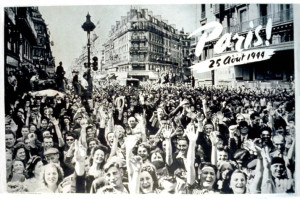When Paris Went Dark by Ronald C. Rosbottom
Written by Ashley Kelmore, Posted in Reviews
Three stars.
This is a dense book, but it’s easy to read. It’s an almost 400-page look at the four years when the Nazis occupied Paris. As someone raised in the U.S., I’ve heard jokes about how quickly the French surrendered during World War II, and how the U.S. liberated them. But that seemed a bit simplistic, so when I saw this in a book store I knew I wanted to read it.
Mr. Rosbottom has done a ton of research and created a really interesting story. Even though there is no, say, central narrative (i.e. there is no one family we follow from start to finish, which some writers of history do, such as Erik Larson did with “In the Garden of Beasts,” which I read earlier this year), each chapter follows the previous in a logical manner, and is still filled with stories that help us understand what life was like.
He spends time talking through how very quickly the French did come to an agreement with the Nazis about how France would be governed. Ultimately this probably saved Paris from being destroyed in bombing campaigns. He follows that up with how the Nazis were greeted and interacted with Parisians during the first year, and how that slowly changed. There were eventually curfews, and rations. Jewish people (especially foreign-born Jewish people) were rounded up and send off to prisons and concentration camps.
And this is where the most interesting discussions come up. How much should the French people – not the military, but the people – have fought back? By not engaging in a resistance movement, were they essentially accepting the Nazis? Were they cowards, or were they people who recognized that they didn’t have much they could do? Should we blame those who, say, served Nazi soldiers, even though the acts of resistance some carried out resulted in many deaths of French people? Do we blame people for doing what they think they need to do to survive?
This is clearly a sore spot in French history. Immediately after the liberation, those who were considered to be ‘collaborators’ were treated horribly – and many of those were women, who were taken in the street, had their heads shaved, and paraded around for sleeping with Nazis. Some people were accused of things they didn’t do and were killed by mobs. And some, like members of the French Police, helped bring in people to be sent out of the country and ultimately killed. How much responsibility should they bear when acting under an Occupation?
These are bigger discussions than can be resolved in one book, but if Paris interests you, if World War II interests you, and if philosophical discussions interest you, I’d suggest this book.

